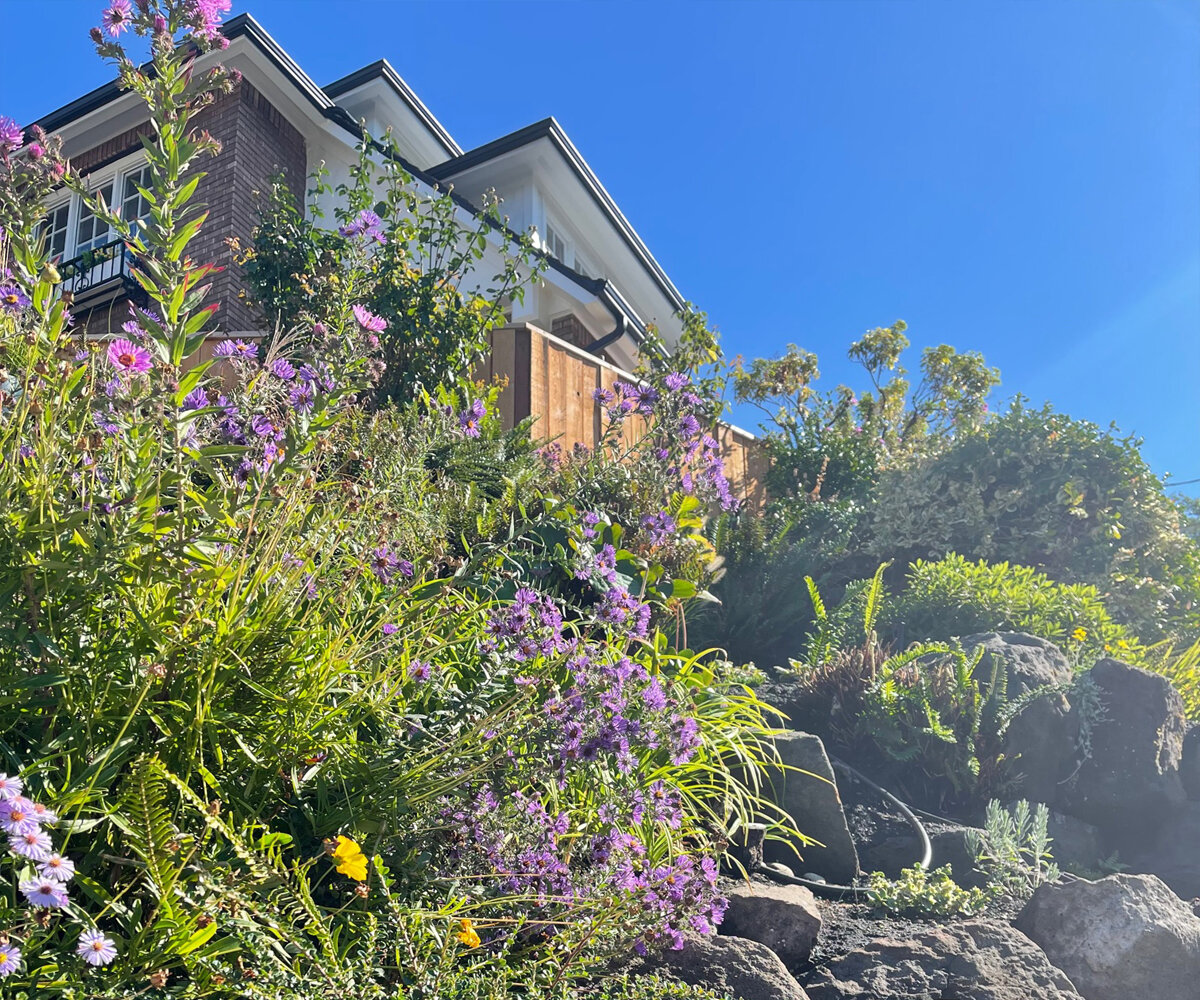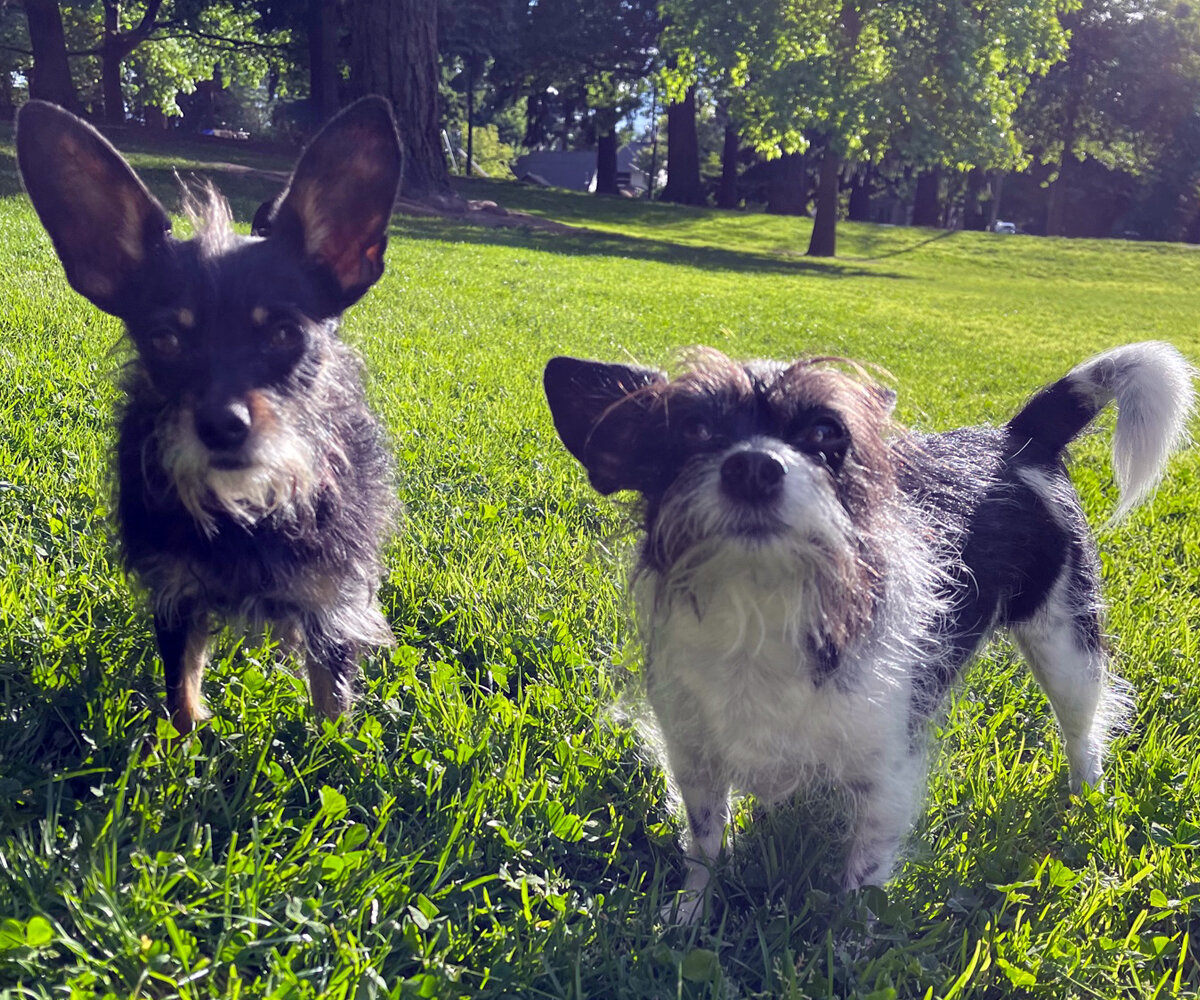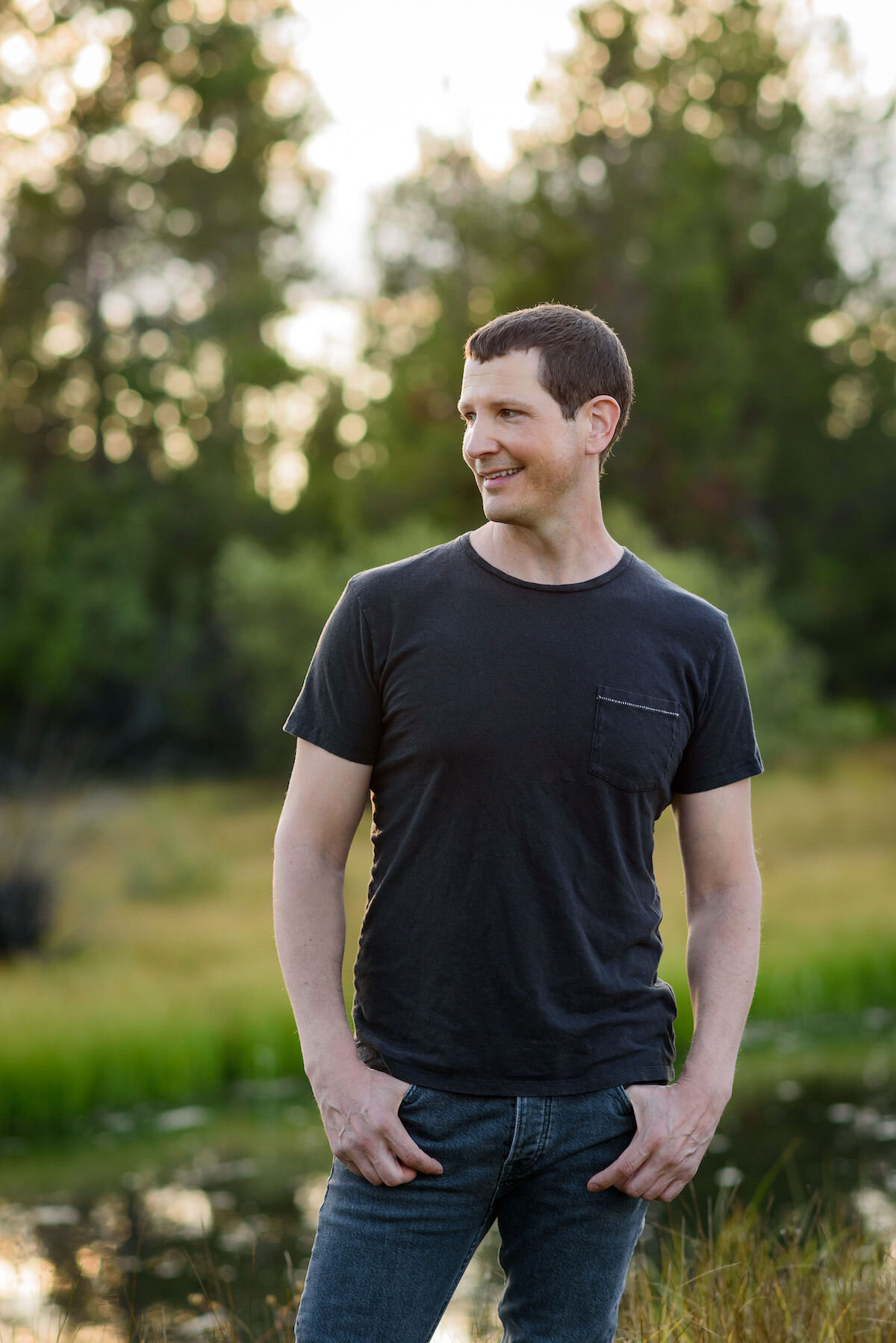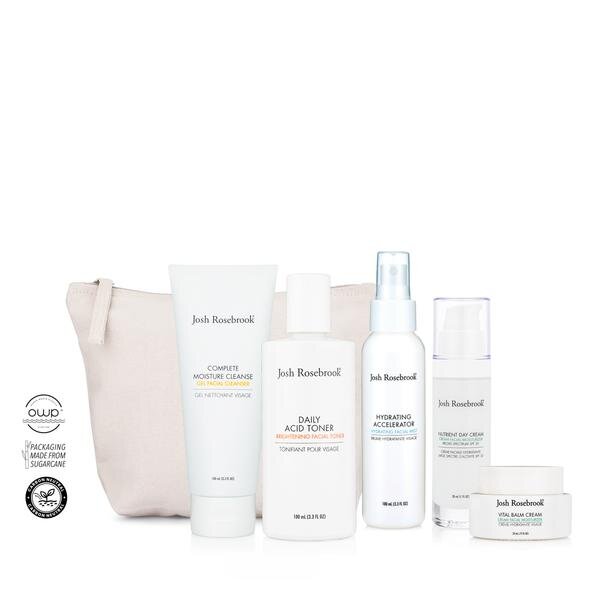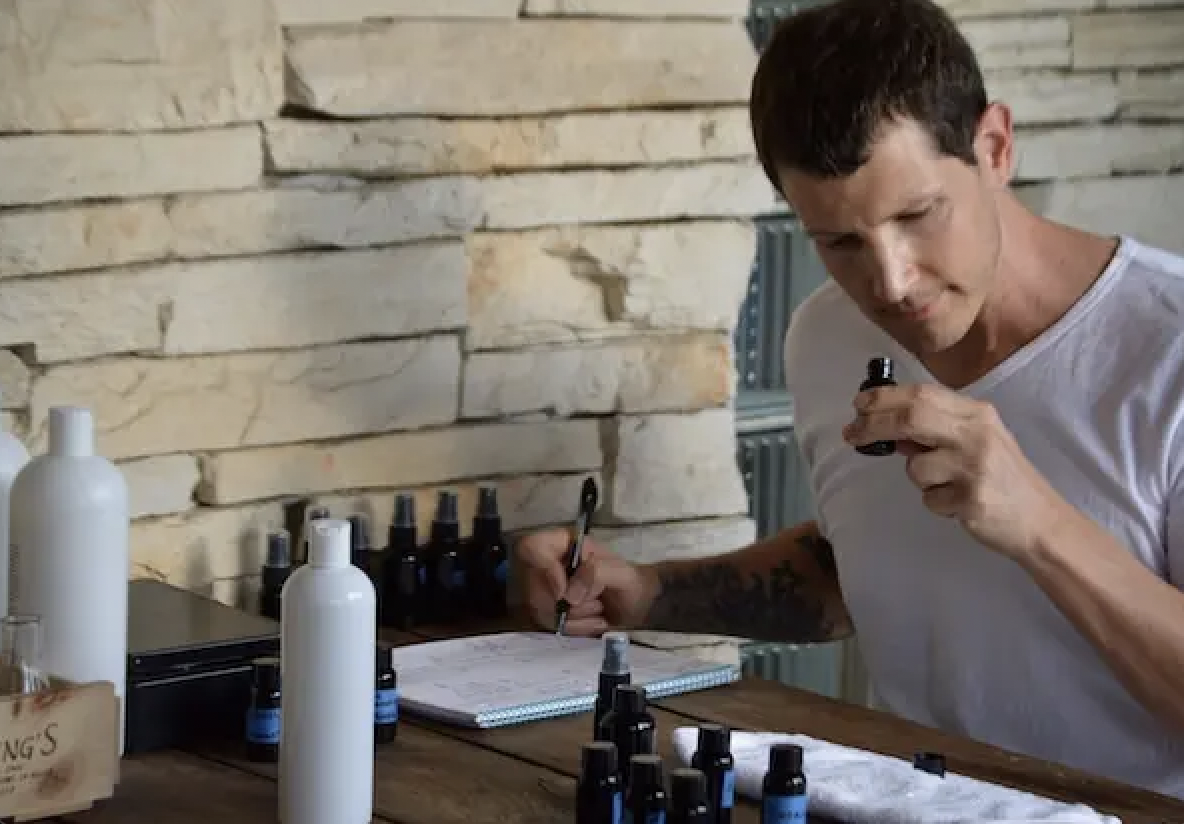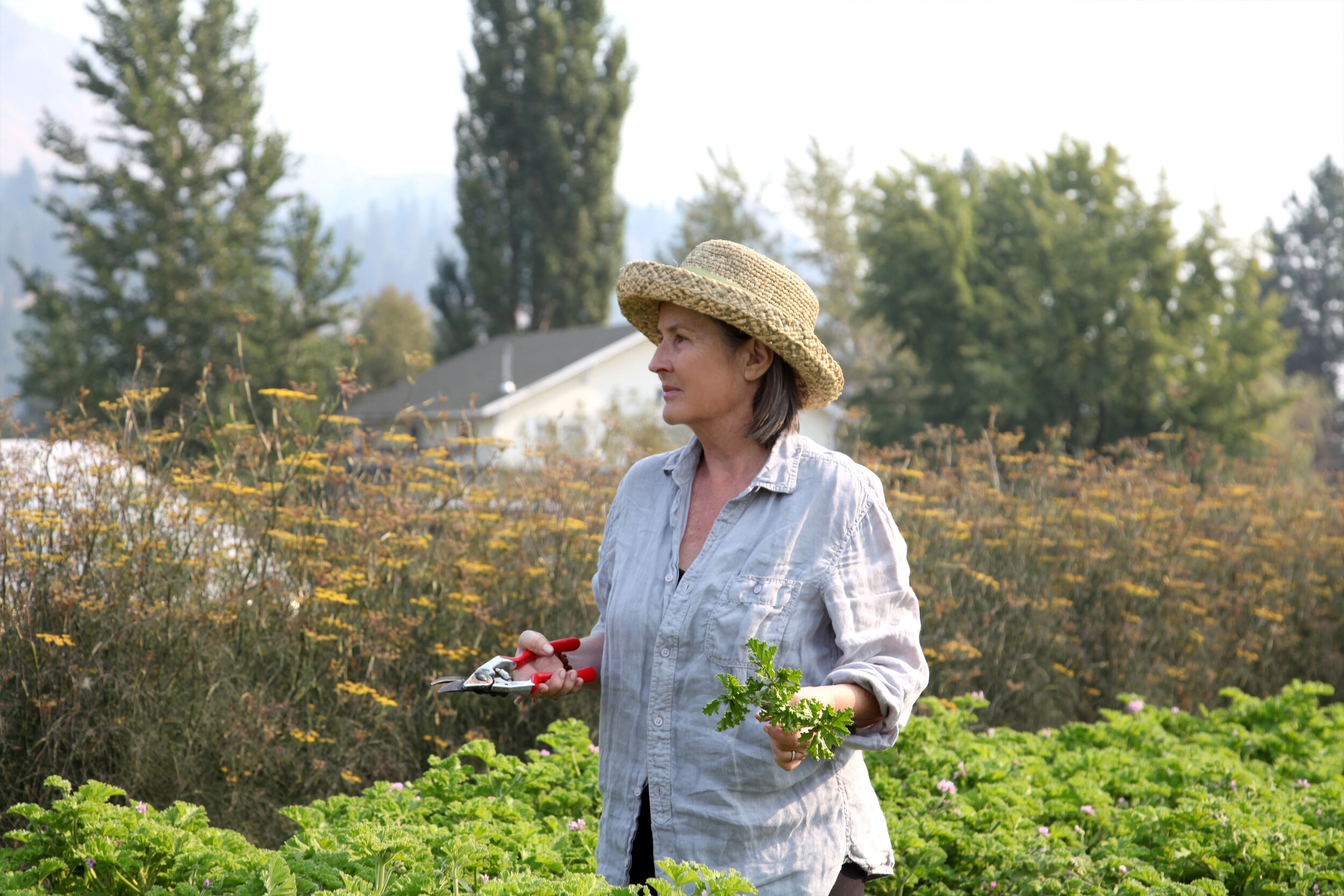josh rosebrook

In 2018, Josh and I met in Seattle and I was immediately struck by his magnetism and clear passion for ingredient sourcing, sustainability, and the dermatological health of the skin. He studied cosmetology and worked as a hair stylist before he began formulating products, first for himself and then, his salon clients. They, like so many of his followers today, quickly fell head over heels for his formulas and became lifelong customers. Josh has been a consistent reference point for the green beauty industry earning wide praise in editorials, as well as from celebrities and bloggers, alike. It’s not an exaggeration to say, I’ve probably turned thousands of people onto the Nutrient Day Cream and Hydrating Accelerator in the past three years. Recently, great change has taken place for Josh personally and for his range of products. We’ll dive into that and much more in the interview below.
MM: Talk to us about your approach to caring for the skin- antioxidants and antiinflammatories, circulation, and the free radical theory of aging?
JR: That is the approach that I studied in school and which resonated with me the most. Antioxidants offer a proven benefit to the skin. We control their efficacy through our discerning sourcing and in-house, fresh extractions, which are made monthly. Those measures contribute to the product's vitality. I also believe in lab synthesized antioxidants like L-Ascorbic Acid, and its powerful ability to support skin health and neutralize damage from UV rays, lightening hyperpigmentation. Thankfully, we’re in an era of embracing beauty and aging, meeting that process with gratitude. However, we still desire to age more slowly, and soften those external signs as well. That’s what I love about SPF, you’re literally protecting your skin from disease.
MM: What are your pieces of advice for caring for the skin in your 20s, 30s, 40s, and beyond?
JR: Advice for your 20s: SPF. One of the most important and impactful preventative measures you can take to care for your skin. In addition to SPF, I recommend hats and hoodies, and clothes or garments which protect the skin. If you have balanced skin, a little exfoliation along with ensuring the skin is hydrated and moisturized. Imbalances with hydration and moisturization, that’s to say: dryness, will accelerate the aging process. Advice for your 30s: start a light retinoid (maybe between ages 28-33), I really don’t think you need a retinoid before this point. Increasing exfoliation is important in this decade. I love my polish that contains enzymes. That was incredibly effective until about 35 when I started needing an acid to break down the bonds of the top layer of the skin more so and in a gentle manner. Advice for your 40s: increasing exfoliation, and making sure you’re perfectly hydrated and moisturized because of transepidermal water loss. Whatever age you’re at, understand your skin, observe your skin. At any age, implement a Vitamin C serum daily to prevent hyperpigmentation and to protect with antioxidants. Also, find a cleanser that really works for you because it is important to remove the day’s grime, pollution, dirt, and oil.
MM: How do you take care of the skin on your body? Any thoughts about upgrading your body care regimen?
JR: I have a body SPF and body cream coming out soon, both contain Vitamin C. They’ll be called C Body Cream and C Body Cream SPF. I love bodycare and I take care of mine so much. I don’t talk a lot about this. Pre-Covid, I was diligent about getting body scrubs at Korean Spas. I’d try and go at least once a month. The history of Korean Spas and that community and relaxation is amazing, I am so grateful for that. It is one of the best things you can do for your body, it stimulates collagen, removes dead skin cells, and gets the lymphatic system moving. I’m a big body scrub person. For someone looking to use one at home, I would recommend Christine’s from 28 Litsea. It’s incredibly well formulated. I’m also working on my own scrub and body acid, so much more to come from the brand in terms of body care offerings.
MM: For someone whose budget can’t afford JRS at the moment, how would you encourage them to take care of their skin, what brands or sellers would you refer them to?
JR: Consider your essentials first and foremost. I like a lot of Burt’s Bees products. They have a great Micellar Water. I can’t say I use a lot of other brand’s products. Because I make all my products especially for my own needs. I do love Meow Meow Tweet. Their products are accessible and sustainable. I think you can also go a long way by purchasing raw plant oils that have a nice fatty acid profile that suits your skin. Oily or acne skin can benefit from an oil that is rich in omega 6 and dryer skin can benefit from an oil rich in omega 9. You’ll save money that way! Keep the oils in the refrigerator. You can purchase some chamomile, calendula, and lavender to make your own extraction in say, a sesame oil. I like Jordan Samuel’s brand and January Labs, both have some nice products and price points. If you’re buying single ingredients seek out small, organic suppliers who can control their quality.
MM: If you could only have a handful of ingredients to use, which would you select and why?
JR: I would be making creams with shea and mango butters, infusing herbs into oils, and incorporating vitamin C-rich ingredients.
MM: What ingredients do you personally avoid?
JR: More than any ingredients, I really consider textures and finishes because experience is hugely important for me. I avoid most products with artificial fragrance, simply because I don’t enjoy those kinds of aromas, not because I am afraid of them.
MM: For years you’ve championed naturals and approaching skincare from herbalism. However, you seem to have a new perspective on things with your addition of a retinoid. Tell me a little about how your views have changed over the years with regards to ingredients and ever-evolving scientific data/research?
JR: Natural ingredients are fascinating. The nutrient density in scientifically studied plants and herbs is astounding. So many natural ingredients are filled with the most efficacious constituents for skin, scalp, and hair. Cosmetic science is equally fascinating and necessary for the highest level of results for skin and hair. As I’ve grown and worked more with chemists, I’ve expanded my horizons and formulas.
MM: Although you’re not a dermatologist, you are a skincare formulator with access to herbalists, chemists, and cutting-edge research. What are your thoughts on Bakuchiol and Retinol?
JR: I would say there are not enough studies to prove the dangerous claims like that you shouldn’t use retinol during pregnancy. People like to make things “bad” so that their products are positioned as “good.” Information is so misconstrued and misrepresented. I was one of those people who misunderstood the science and I want to be a part of supporting a better understanding now. It’s been used and widely studied since the 1940s. As far as Bakuchiol is considered, I think it has a weak body of evidence. The hype isn’t justified by the data. It’s not a retinol, retinoid. The two studies didn’t even have a control group. Don’t appropriate retinoid by saying there’s a retinoid-alternative, because that insinuates retinoid is negative.
MM: Teach us how to read an ingredient label? I loved when you mentioned ingredients under 1% do not need to be disclosed in the States. Do you disclose every ingredient in your products? If say, the Aloe Vera is preserved with another ingredient, does that preservative get disclosed?
JR: Because we sell in the EU, we have to disclose everything even if it was at .002%. I would have to disclose everything. Look for brands that are carried in the EU, those brands and formulas have been studied and scrutinized by the most aggressive bodies and groups. All the certifications that brands slap on labels don’t come close to the EU compliant criteria. When you see, for example, four or five preservatives at the bottom of your formula, it doesn’t mean there’s a huge percentage of those ingredients. It means the brand has integrity and is disclosing in full their integrity-forward formula.
MM: How does Hydrating Accelerator differ from the function and effect of a Hydrosol?
JR: The Hydrating Accelerator is formulated to quickly penetrate beyond the surface of the skin through the proteins and lipids, beyond the stratum corneum. The skin is hydrophobic so it helps that our product contains oil molecules to penetrate more deeply. It’s a compatible product to the acid mantle’s lipids and perspiration.
MM: Cacao Antioxidant Mask was the first product you formulated and to be honest, it flew under the radar for me for a few years. I love it now- from my point of view, it is so brightening and revitalizing in terms of circulation and activating the skin. What effect does it offer the skin?
JR: It’s been on the market for 12 years. It activates the circulation of the skin. It stimulates blood flow which helps the skin move through unwanted things, circulates nutrient density in the skin, oxygenates the skin to a degree. Supporting the skin in what it already does. The skin knows how to heal and protect itself. Good skincare facilitates your skin’s natural functions. It works for all skin types, dry and dehydrated skin benefits from its oil profile, oily skin will be balanced by its drawing potential. It doesn’t heal but it helps speed the skin’s own healing.
MM: What misunderstandings do you want to address?
JR: I think the industry thrives off of division and judging things as good or bad, clean or dirty. You don’t want to approach things from a savior perspective, because then you’re pushing others down to pull yourself up. We have to understand and respect the whole spectrum of ingredients and technologies. Lab-made ingredients or synthetics offset the environmental pressures of natural ingredients. We can appreciate everything and still sell products. You don’t have to demonize something in order to build your brand. I wish the industry would respect cosmetic science as much as the organic, sustainable natural ingredient movement. We’ve all learned that non-toxic really isn’t true anymore. Toxicity depends on percentages, on formulas, etc.
MM: When you really indulge in self-care, how do you take care of yourself at home? Give us some at-home spa inspiration!
JR: When I do the most, I draw a bath and use Sarah’s Bath Salts. I dry brush (thank you Ayurveda and Indian Culture). I will be applying the Active Enzyme Exfoliator and hopping into the bath, I’ll rinse it off and then apply Cacao Antioxidant Mask while soaking. I may listen to Vivaldi or Chopin or indie-pop. Light some candles. I might have a massage therapist come to the house and give me a massage if I’m really treating myself.
MM: You once said, you never worked on formulating new products unless you were inspired. You’ve gone to great lengths and taken time between launches to get formulas just right. Talk to us a little bit about the process of formulation--inspiration, blending, iterations, and testing?
JR: I have to be inspired or I literally can’t work on it. With product development, I have a lab and ingredients, extracts, essential oils. I come up with ideas of products that I think will be great. I form the base and it either takes off and is constantly re-formulated and revised or it doesn’t and I move on. As selfish as it sounds, I really do formulate products I want/need for myself and only items that feel genuinely original.
MM: On the subject of formulation, you’ve recently re-released Active Infusion Oil (with added C and retinoid), Is there anything else on its way?
JR: On their way are the C Body Lotion, C Body Lotion SPF, and down the road a body scrub. In the last year or so we have launched an unscented Vital Balm Cream which is selling like crazy, along with Essential Balm Cleanse, a balmy oil to gel to milk formula that destroys makeup. In the winter, we’re releasing C Bright Complex, it is incredible incorporating Ethyl Ascorbic Acid, L-Ascorbic Acid formulated with Gold Particles which help to stabilize the volatile ingredient. Next year: bio-mimetic plant peptides and stem cells. Also, there’s a dandruff shampoo on its way so stay tuned for that!
MM: What supplements, teas, treatments, and technologies or tools do you find impactful for your skin and body’s health?
JR: Drinking tea is so good for you and your health. I drink a lot of Green Tea and in the evenings, I’ll usually enjoy Chamomile or another herbal blend. Technology has advanced a great deal: I’m a fan of laser work and radiofrequency, as well as ultrasound technology which works on the structure of the skin. Those are all really awesome. I like Thermage and Ultherapy. If you need it, a nice glycolic peel can do you good every once in a while. I personally like Microdermabrasion, a week later my skin looks amazing. I like facial massage, Treatment by Lanshin has amazing tools and practices that draw upon Asian cultures and traditions. We’re so lucky to have access to those.
MM: What do you know for sure and what gives you hope?
JR: I know for sure that I don’t die, my soul lives on after I leave this body. This is not the end. This is an experience, a school where we can create our own reality, have fun, and love. What gives me hope--why is that a hard one--what gives me hope is whatever inspires me. I feel hopeful when I am inspired. Inspiration is the alignment with our soul. That, and kindness between people in everyday life, people are kind when they are happy.
